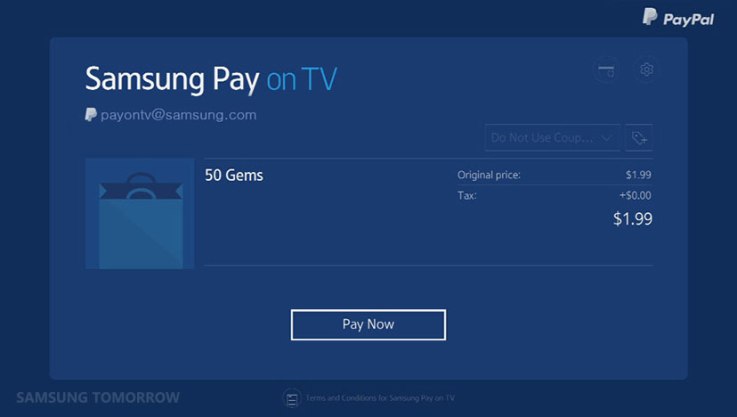
Last March Samsung announced Samsung Pay — a mobile payment offering which it hopes will go head to head with Apple Pay. The service has still not rolled out yet but Samsung is expanding its payment push to smart TVs, with the launch of Samsung Pay on TV — which it says will be coming to ‘select’ 2014 and 2015 Samsung smart TVs, initially in 32 countries.
While Samsung Pay on mobile will use magnetic secure transmission tech, and also support NFC, in order to be compatible with retailers’ point of sales terminals, Samsung Pay on TV is necessarily a different animal. Samsung says it partnered with PayPal to create a pay-by-PIN process to let its smart TV users register payment card/PayPal details so they can buy stuff on their TV with a few button pushes in future. So this is also about Samsung opening up its Tizen OS-based smart TVs as a platform for ecommerce.
Here’s how Samsung describes the pay on TV process:
The payment service on Samsung Smart TV was designed from scratch to provide an easy and safe payment experience specifically for the TV. It supports major credit cards, debit cards, PayPal as well as other mobile billing options. The beauty of it is that in most cases, users can complete a payment in just three steps after the initial registration setup. First, choose the item you want to purchase. Then simply press the ‘Pay Now’ button, and enter the PIN (Personal Identification Number). That’s it!
It adds that it’s created a secure virtual keyboard as an input mechanism for when users are entering credit/debit card information or their PayPal password on the TV.
Samsung users who already have a Samsung mobile account will be able to transfer their account info and registered payment methods to the smart TV “without additional registration steps”, according to the company’s announcement.
Whether you’ll want to pay for any of the content available on Samsung TVs is another matter. The initial offering appears pretty limited, with Samsung listing just seven game titles (with titles like Golf Star and Casino World Championship). However it says it will be adding additional premium content “within new and world-renowned games” that will be available via in-app purchases in future.

Comments
Post a Comment